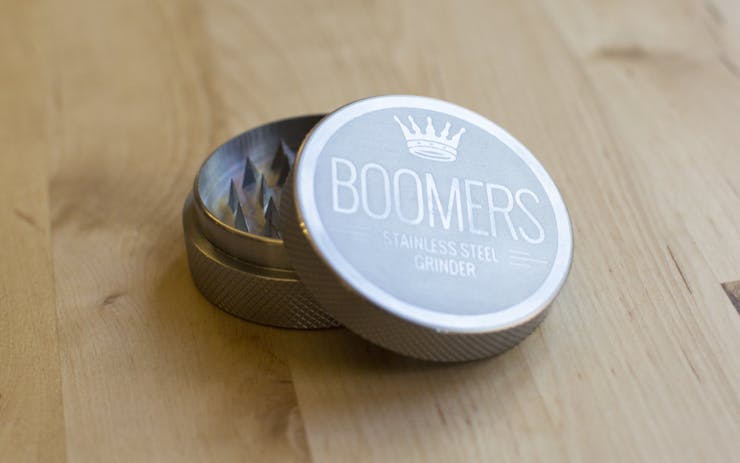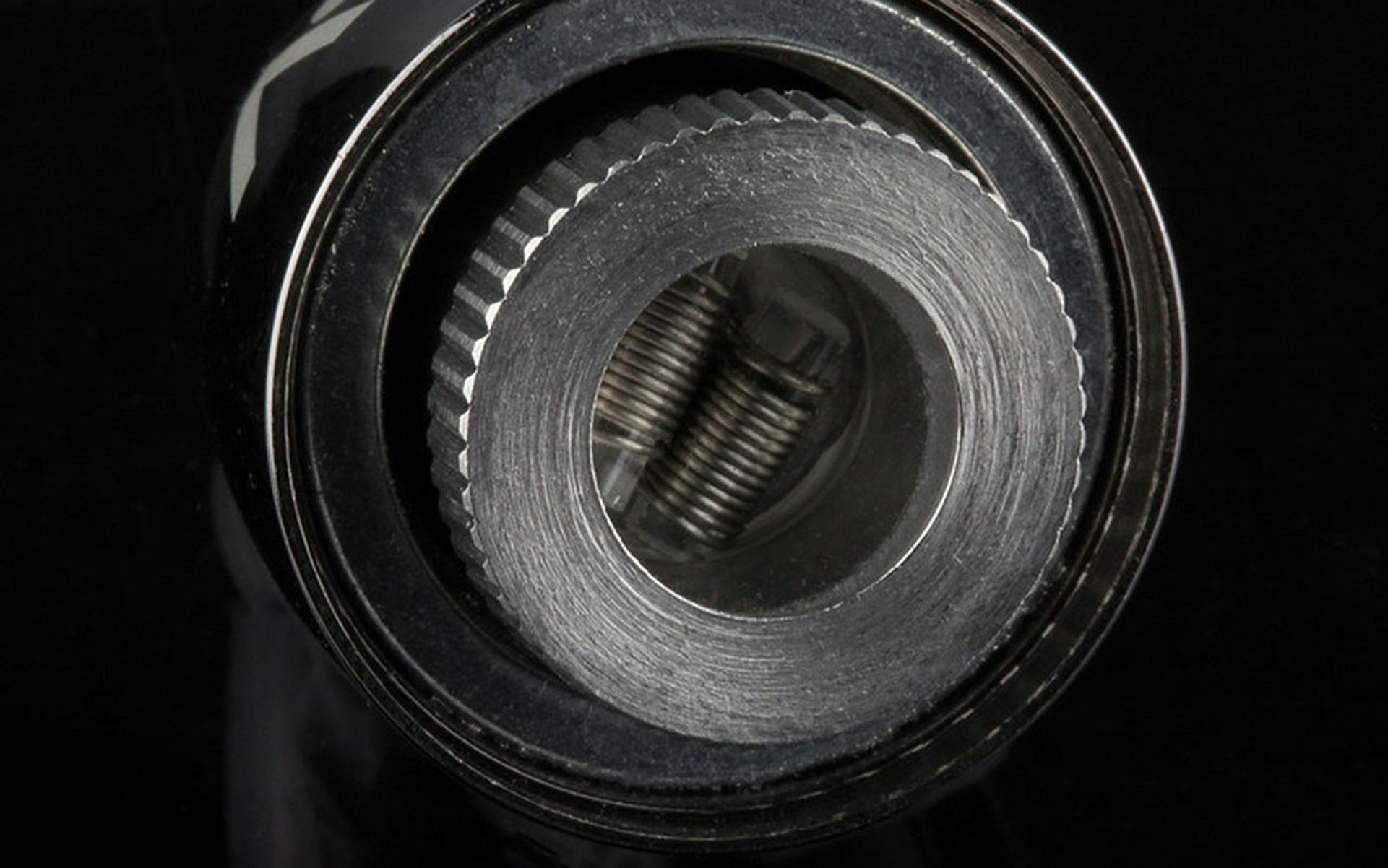Editor’s note: This story was updated on Oct. 18, 2017.
In 1905, a pair of Australian residents were awarded the first US patent for what we now recognize as an “herb grinder.” The invention was designed to be used by tobacco smokers, specifically “to enable plug-tobacco to be disintegrated for pipe-smoking without the use of a common knife.”
Suddenly, instead of rubbing plugs of tobacco between their hands or chopping them up with kitchen knives, smokers could easily grind and store material for later use. Huzzah, the industrial age!
The classic grinder design hasn’t changed much in the 102 years since. The vast majority—including leading brands like Santa Cruz Shredder and Space Case—look pretty much like what’s depicted in Patent #795,746. Although somewhere along the line, manufacturers decided that for mass-produced grinders, aluminum was the material of choice.
If you own a grinder—and it’s not plastic or wood—chances are it’s aluminum.
Whether that should bother you is a matter of considerable debate. There’s a longstanding controversy over the safety of aluminum, with more recent studies indicating there’s at least some reason to believe that ingesting the metal may increase the risk of Alzheimer’s disease. (There are conflicting reports, but a 2016 meta-study found that individuals chronically exposed to aluminum were 71% more likely to develop Alzheimers disease.)
I recognize even basic scientific claims these days are polarizing. I’m not trying to incite mass fear of aluminum grinders. But personally, I didn’t like scraping my grinder clean and finding flecks of a potentially dangerous metal mixed in. I figure I’m inhaling enough crap in my spliff as it is. So when my go-to grinder recently went missing, I went searching for something different.
Here’s what I found. (For all the grinders I’ve tried myself, I’ve included pros and cons.)
Stainless Steel
Aside from glass or ceramic, stainless steel is generally the first choice for food-safe kitchen utensils. Given that, it seemed like a sensible place to start. Unfortunately, however, it turns out hardly anyone makes grinders out of the stuff. Even some products advertised on Amazon as stainless steel turn out to be aluminum or some unknown mystery metal.
But I did find a few:
Cycle Grinder ($139, 4-piece)

(Courtesy of Cycle)
The German-designed Cycle grinder seemed like exactly what I was looking for. It’s basically your standard four-piece grinder but machined entirely from surgical stainless steel.
Unfortunately, it’s damn near impossible to get your hands on—at least for now. For a while the company was accepting pre-orders that were advertised to ship in May. In early July, they posted to Facebook that shipping was “in progress,” but as of mid-August, nobody seemed to have received anything. (The company hasn’t posted to Instagram since December, and its last tweet, on July 14, 2016, says simply, “Cyleeeeeee” [sic].)
I tried getting in touch with the company but didn’t hear anything back. So I moved on.
TL;DR: Great idea, impossible to find.
Lift Innovations ($100, 4-piece)

(Julia Sumpter/Leafly)
The Lift grinder, formerly known as the Clipper, is still mostly aluminum. But the key components—the parts that actually process the cannabis—are stainless steel.
The product has earned breathless reviews. Even before it was released, Green Rush Daily gushed that the grinder was “set to revolutionize the world of cannabis.” That’s an overstatement, but it is one of the few that breaks with ol’ Patent #795,746, ditching teeth that grind for a stainless-steel blade that cuts your cannabis. It’s also customizable, with various sifting discs and mesh screens (all of which are stainless steel) available to adjust grind size and kief collection.

Courtesy of Lift Innovations
I really like this grinder. It’s rather bulky and heavy, but it feels durable and well made. It cut cannabis into a fluffy mixture and handled all sorts of bud with ease. Whereas traditional grinders can sometimes get sticky and clogged, the Lift grinder consistently spun smoothly—which is nice in general but might be especially helpful for folks with arthritis.
My only issue with its operation was that the cutting blade doesn’t always bite into the bud very well unless you really mash it into the grinder. It’s a bit like how ice cubes can bounce around in a blender without being crushed.
For my purposes, the customization doesn’t matter much. I’m using the medium sifting disc and the coarse kief screen, which have worked fine for spliffs and joints. To switch the pieces, you’ll need to use the included tool, which doubles as an ashtray. (This seemed like a gimmick until I realized that using it as an ashtray kept me from misplacing it.) My request to the company: Put a little divot on the lip of the ashtray so smokers can set down their joints.
Pros:
- Easy operation
- Great final grind
- Customizable
- Solid, durable construction
- Pieces screw together with a simple quarter-turn
Cons:
- Not entirely stainless steel (body is aluminum)
- Bulky, heavy, hard to carry in a pocket
- Lots of parts
- Occasional “ice-in-blender” problems
TL;DR: This is a top-of-the-line, full-featured grinder that uses some stainless steel parts. It’s a pleasure to use—and it’s what I find myself picking up at the end of the day—but it isn’t quite what I set out to find.
If you’re looking for a similar design for a lower cost and materials don’t matter as much to you, Lincig offers a copycat, all-aluminum version for $60.
Boomers Grinder ($95, 2-piece)

(Julia Sumpter/Leafly)
Keep it simple, stupid? That’s what you get with the Boomers grinder, for better or worse. It’s a two-piece grinder—no kief catcher or section to store your ground cannabis—and it’s 100% stainless steel.
It’s also 100% heavy, weighing in at nearly a pound.
The Boomers grinder works wonders in terms of breaking up bud. It’s been carefully machined and its teeth are sharp as hell, so even dense nugs or small stems don’t stand a chance. The downside, for me at least, is that it’s hard to get the ground flower out without dumping the whole thing—and if I try to reach my fingers in, those sharp teeth poke me.
It’d be a great tool for folks who grind up a lot of flower, dump it onto a rolling tray, and start rolling. But as someone who rolls a lot on the go, I prefer an easier way to pour cannabis out of a grinder.
Pros:
- Simple, no-nonsense operation
- 100% stainless steel
- Durable and easy to clean
- Probably functions as a self-defense tool
Cons:
- Only available as a two-piece grinder
- Difficult to “pour” cannabis precisely
- Will probably poke you
TL;DR: Boomers is the only 100% stainless-steel grinder I could find that’s currently on the market. If you’re set on stainless steel and don’t mind a two-piece grinder, get this one.
Other Alternatives
There are a few other aluminum alternatives aside from stainless steel. A handful of manufacturers now offer aluminum grinders that have been coated with other materials, putting a barrier between it and your cannabis. A few others use other metals; I’ve seen zinc and chromium advertised. Here are a few top choices:
SLX 2.0 ($50, 4-piece)

(Courtesy of SLX)
The SLX grinder starts with a higher-grade aluminum than most grinders, then coats it in what the company describes as a food-safe, FDA-certified ceramic material that’s free of Teflon, PTFE, “or any other carcinogenic materials.” The coating covers all the exposed aluminum and is even nonstick, the company says, making the pieces easier to turn and less likely to clog over time. (And if it does eventually get gunky, it’s a cinch to clean.)
While I don’t love that the core is still aluminum, this little grinder has won me over after about a month of regular use. As a number of other reviewers have said, the ceramic coating makes for smooth operation and has a surprising degree of durability. I’ve tossed it carelessly into my backpack, loaned it to friends, even dropped it a few times by accident on concrete sidewalks—and the coating has yet to chip or flake off. The design of the teeth is also noteworthy; they’re shaped sort of like little trapezoids and provide a fluffy, consistent grind.
Pros:
- Smooth, reliable operation
- Traditional four-piece functionality
- Ceramic coating completely covers aluminum
- Lightweight and easy to carry
- Fluffy, consistent grind
Cons:
- Coating may eventually chip, exposing aluminum
- Integrated kief tray can rattle a bit when carried
TL;DR: If you’re looking for a no-frills grinder that improves on the traditional 4-piece aluminum design, the SLX should be on your short list. It’s reasonably priced, a breeze to use, and unlikely to clog or stick even after heavy use. If only it came in stainless steel.
Space Case Titanium ($85, 4-piece medium)

(Courtesy of Space Case)
Space Case is one of the most popular names in grinders, and when I told people I was looking for a non-aluminum one, lots of folks pointed me toward the company’s titanium line. Like SLX, Space Case’s titanium grinders are aluminum that has been coated—in this case, with a titanium compound.
Reviewers online rave about Space Case’s precision engineering, ease of operation, and longevity. But a few reviews I came across complained that the titanium coating chips away over time, exposing the aluminum underneath. That might not bother most people, but it’s not what I was looking for.
TL;DR: It’s a much-loved grinder, but the titanium coating may eventually chip.
Chromium Crusher ($10, 4-piece)

(Courtesy of Amazon)
The first non-aluminum grinder I bought was this one. It claims to be made of a “durable zinc alloy” rather than aluminum, although frankly I don’t know what that means in terms of human health. Trace amounts of zinc are essential for good health, but too much can be harmful.
I got a lot of mileage out of my Chromium Crusher, but it suffers from many of the same flaws other grinders do: It clogs up over time, the lid can stick, and scraping it out shaves off little pieces of metal that can end up contaminating your cannabis. I felt more comfortable using that than an all-aluminum grinder, but I’m happy to have moved on to other alternatives.
Pros:
- Affordable
- Durable
- Familiar operation
- Not aluminum
Cons:
- Not a traditionally food-safe material
- Clogs easily
- Can leave metal shavings in cannabis
TL;DR: This non-aluminum grinder won’t break the bank, but the benefits over aluminum are limited.
OK, so here’s the part where I admit I’m just a news editor who likes cannabis—not a hardcore product reviewer. If there’s anything I missed, pleae let me know in the comments or ping me on Twitter.
Back to the grind!







